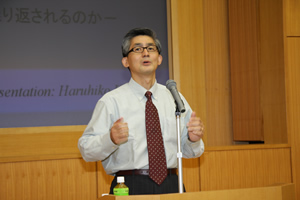
Mr.Haruhiko Higuchi, Chief Professor
at the Police Policy Research Center,
National Police Academy
|
1. Wednesday, July 30, 2008
(1) Lecture: Haruhiko Higuchi, Chief Professor at the Police Policy Research Center, National Police Academy
Mr. Higuchi lectured on the topic "Learning about Undesirable Organizational Activities -- Why We Keep Making the Same Mistakes Over Again" introducing the fundamental organizational causes that underlie all of the latest scandals and the posture of management. The lecture can be summarized as follows.
From my many years of experience in the field of crisis management in the police force, I recognize the importance of risk management for the purpose of preventive measures against the outbreak of crises. Scandals and accidents have become commonplace recently, but instead of seeking out the specific individual or individuals responsible, we need to take the stance of thinking of this as a problem that exists within the overall organization.
The fire that broke out on the Mitsubishi Heavy Industries passenger ferry in 2002 was attributable to welding operations that were not carried out in accordance with the manual. Against that backdrop, we have the problems of "too many manuals and rules to be followed" and "with all the meetings and reports, site supervisors just don't have the time." We have to guard against the volume of manuals and reports becoming so great that contrary to the intention, it results in sloppy management.
In the Mihama Nuclear Power Station pipe rupture accident of 2004, the portion of the pipe that ruptured had been inadvertently omitted from the inspection list. The fact that this omission had not been rectified for all those years was due to Kepco transferring the inspection work from the plant's manufacturer to a subsidiary as a cost-cutting measure. This is a prime example of negative effects on long term indices such as safety in the pursuit of short term performance gains.
In last year's "Aru Aru Daijiten" [television program] fabrication incident, it became clear that the sham was the result of the rigidly structured hierarchy in the field of television where program contents are created by sub-sub production companies. This sort of situation is spreading throughout every field of business as outsourcing continues to expand. We had better learn from this that if we do not abandon the attitudes of privilege and looking down upon subcontractors, sooner or later the rug will be pulled out from underneath our own feet.
The fraudulent processing of Social Insurance Agency transactions that came to light in 2006 were rooted in the personnel evaluations that came with the performance-based pay scale system. The performance-based wage system is very difficult, and it requires a high level of management capability in order to implement it wisely. By placing too much emphasis on numerical values in the performance-based pay system, there is a risk of distorting the actual on-site work in an unintended direction.
The "strength of the middle management" is the "strength of the organization." Middle management is the commander at the work site, and what is expected of middle management is for them to see to it that their subordinates do what they are supposed to do. In order to accomplish that, not only must they have a thorough understanding of the details of the work at hand, they also have an indispensable responsibility to explain it to their subordinates. Furthermore, they must be able to resist drifting along with the flowing tide of daily routine, and not allow their attitude toward others to be changed.
And finally, "middle management has to play the role of the bad guy" is the most important point. In order to maintain the soundness of the organization, someone must play the role of the bad guy. That role falls upon the shoulders of middle management, who have to be prepared to accept being disliked.
|







